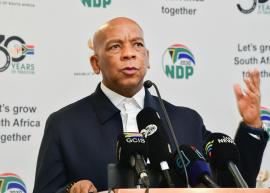
Electricity and Energy Minister, Dr Kgosientsho Ramokgopa, has announced that Eskom’s unplanned capability loss factor (UCLF) has significantly improved, indicating that the system is becoming healthier.
“If you look at what the UCLF recorded over the past seven days, you see that we’ve been averaging at about 10 500 megawatts, essentially 10 500 megawatts of capacity that is installed was not available on account of various reasons. [These include] the units failing and units not performing at their optimal capacity. If you had to compare this with the same period last year, it’s an improvement of about 5 000 megawatts.
“That’s significant, and that’s why we have been able to keep the lights on [for a] very considerable period,” Ramokgopa explained on Monday.
WATCH | Minister Ramokgopa briefs media
The Minister was briefing media in Pretoria on the Independent Power Producer (IPP) programme as part of his regular energy security updates.
“It’s important that we’re able to consistently improve this kind of result. And of course, in numbers, it means that there’s less and less reliance on diesel to power our electricity requirement.”
Starting from 1 April to 17 October 2023, Eskom spent about R18 billion to prevent power cuts, down by R12 billion compared to the same period this year.
“There’s less reliance on diesel. And if you look at the open cycle gas turbines (OCGT) load factor, the percentage of time that we’re relying on these at the same period last year, we were sitting at about 8.95% and this year, we were sitting at about 4.59%,” Ramokgopa said.
The Minister believes that this speaks to the improvement of Eskom’s systems, which he stated will be passed on to the end consumer.
Load shedding
Ramokgopa said it was an “anomaly” to celebrate the fact that there were 208 days of no load shedding.
“That should be the standard… The standard is that there shouldn’t be any load shedding, and the standard should further suggest that we should not rely on expensive fuel sources to keep the lights on.
“This is not an achievement but a step in the right direction. An achievement will be when there’s no load shedding and [we] can use a cheaper form of existing generation for us to keep the lights on. And that’s where the Independent Power Producer programme comes in.”
IPP programme
Shifting his focus to the IPP programme, Ramokgopa said that the programme has procured 15 432 megawatts of renewable energy since its inception in 2011, with 8 231 megawatts currently in the market to be evaluated and 1 897 megawatts under construction.
Ramokgopa said the seventh administration plans to be aggressive in procurement, with interventions to improve the programme’s structure and efficiency.
The renewable energy projects are concentrated in the Western Cape, Northern Cape, and the Eastern Cape, leveraging optimal renewable energy resources.
In addition, the Minister said this move has created 85 800 job opportunities and contributed significantly to local economies, with a focus on socio-economic transformation.
Ramokgopa announced that the project has seen significant market confidence, with international and domestic investments totalling R272 billion.
The focus, he stressed, is on making electricity generation more affordable and competitive, to reduce reliance on expensive fuel sources.
“The focal point of the ministry is to ensure that we can reduce the cost of electricity in the country, make businesses competitive, and ensure that [sustain power] in households.” – SAnews.gov.za


